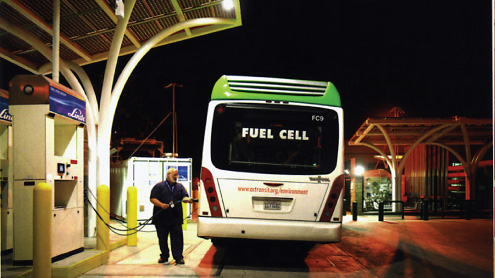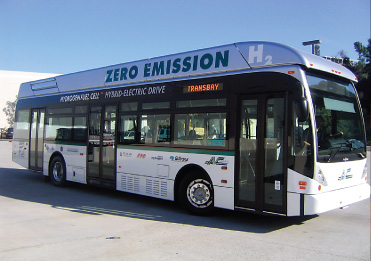
Solar-powered electrolysis highlights its newest hydrogen production and dispensing station
By Clarence L. Johnson
Edited by David Hubbard

AC Transit is one of the largest transit agencies in California, serving over 60 million passengers a year throughout a 364-square mile region. AC Transit, Emeryville CA, and its coalition of regional transit and energy partners operate the latest generation of zero-emission fuel cell buses that serves the seven million people in the San Francisco Bay Area.
Fuel cells do not burn the fuel they use. Instead, they combine hydrogen with oxygen from the air electrochemically to produce electricity and emit only water vapor. AC Transit operates 12 Van Hool 40-ft hybrid-electric, zero-emission fuel cell buses, each powered by a 120 kW UTC Power fuel cell system and a Siemens ELFA Drive System.
The agency unveiled its newest hydrogen production and dispensing station in April, in which the hydrogen is in part the result of solar-powered electrolysis. Federal, state, and local officials were on hand to formally dedicate AC Transit’s newest on-site energy station.
For now, the new facility will fuel the fleet operating in AC Transit’s service area, and will expand throughout the region in the coming year.
“For over a decade AC Transit has been developing the most comprehensive, zero-emission, fuel cell transit program in North America, and operating zero-emission buses in real-world service,” says AC Transit General Manager David Armijo. “Now, with increased fueling capacity, we have a greater capability to offer clean, quiet, zero¬ emission transportation to the communities we serve.”
With engineering by Linde North America, Jacobs, and EPC, and W.L. Butler Construction building the facility, the station demonstrates the use of “renewable” hydrogen produced by a solar-powered electrolyzer from Proton OnSite. Through its C-Series Fuelgen, the company makes hydrogen on site via PEM electrolysis using part of the available solar energy to do so.
Linde constructs and operates hydrogen vehicle fueling systems and is supplying hydrogen and fueling technology for two new stations at AC Transit’s Emeryville and Oakland operations.
Cupertino Electric, Inc., an engineering and construction firm, installed a 510 kilowatt DC solar photovoltaic system for AC Transit that will generate the energy to help fuel the transit system’s hydrogen-powered buses. The station also features Linde’s latest advancements in compression and dispensing technology that enables refueling of buses at rates up to five kilograms/minute — comparable to refueling diesel buses.
In addition, a major grant from the California Air Resources Board makes one dispenser accessible to the general public for fueling hydrogen fuel cell electric passenger cars, including the Mercedes-Benz B-Class F-CELL, now on the road in both Northern and Southern California.
Partners on the HyRoad
UTC Power, South Windsor, CT, a United Technologies Corp. company develops and produces fuel cells that generate energy for buildings and for transportation, space and defense applications.
In recognition of AC Transit’s solar installations across its facilities, Pacific Gas and Electric Company (PG&E) presented a check, representing what will amount to more than $500,000 in rebate incentives from PG&E through the California Solar Initiative (CSI) program, to AC Transit’s General Manager.

Additionally, in honor of AC Transit’s HyRoad Program, Tom Sullivan, Chairman of Proton OnSite, presented a $20,000 check to Lawrence Hall of Science at UC Berkeley to further youth science education in alternative fuels.
Siemens, a global manufacturer and provider of drive systems for public transportation systems, has a long partnership with AC Transit and provides the electric power train, which consists of the traction motors including gearbox, the inverter system and the application software that ties in the fuel cell power plant. BR
